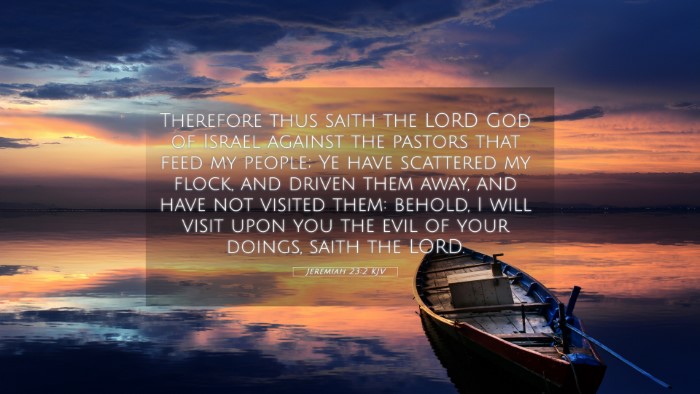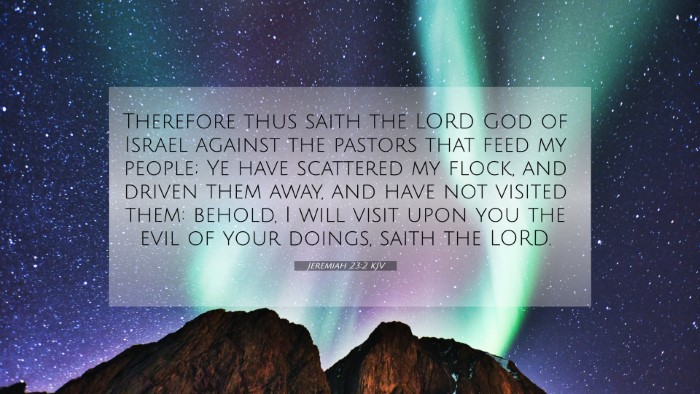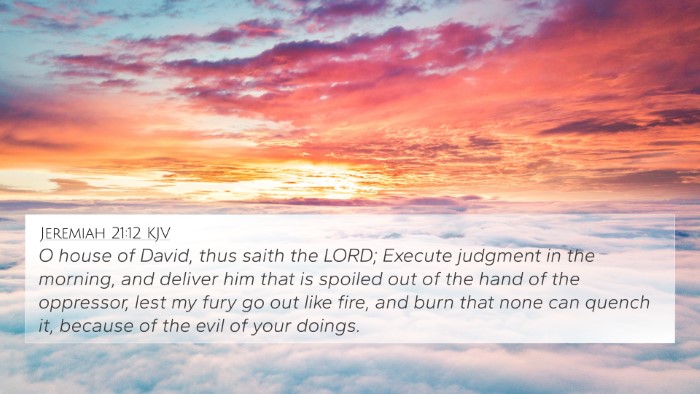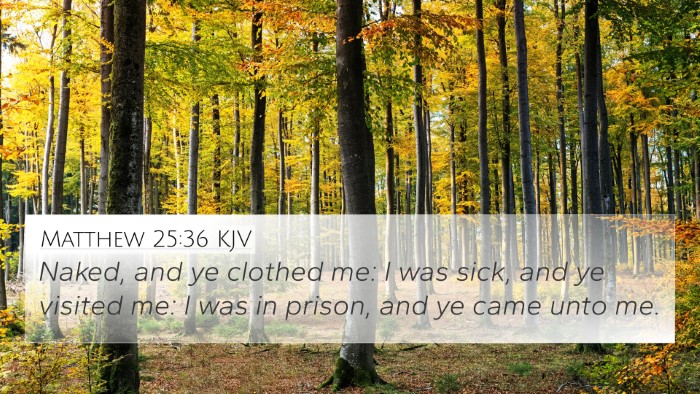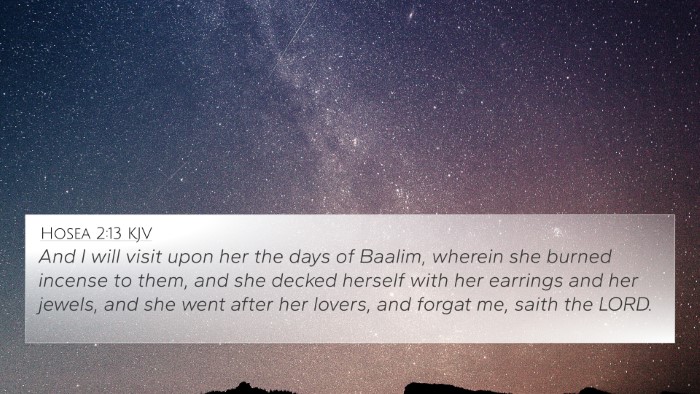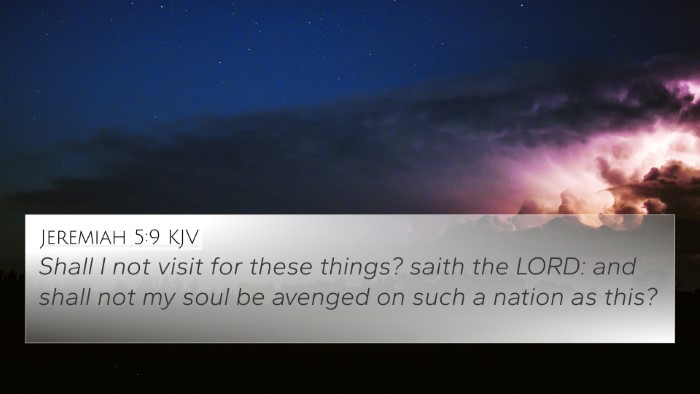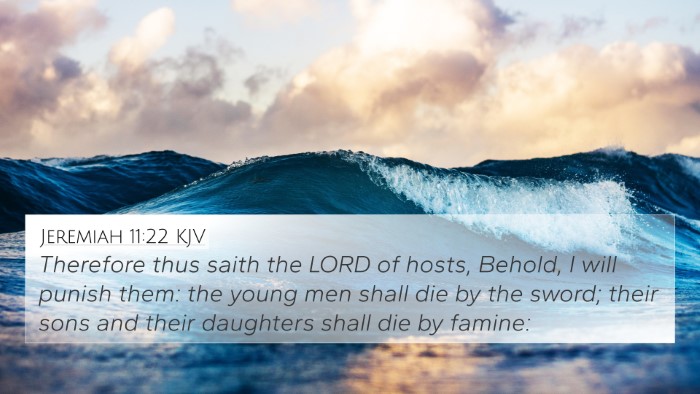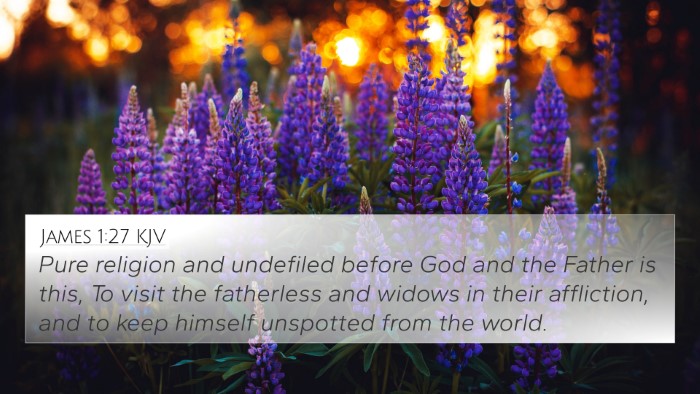Understanding Jeremiah 23:2
Jeremiah 23:2 states:
"Therefore thus saith the Lord God of Israel against the pastors that feed my people; Ye have scattered my flock, and driven them away, and have not visited them: behold, I will visit upon you the evil of your doings, saith the Lord."
Context and Overview
This verse serves as a poignant warning from God to the leaders of Israel, specifically the false prophets and shepherds who have failed in their duties. The imagery of shepherds and their flock is common in the Bible, denoting a relationship of care, guidance, and protection that is expected of leaders over their people.
Commentary Insights
According to Matthew Henry, the severity of God's displeasure with the unfaithful shepherds is evident. He emphasizes that these leaders, rather than nurturing their flock, have dispersed them through neglect and poor leadership. This neglect has spiritual and communal ramifications, leading to disarray and confusion among the people.
Albert Barnes highlights that the phrase "I will visit upon you" indicates divine judgment. This concept reflects God’s justice in holding leaders accountable for their actions, illustrating the serious responsibility inherent in leadership roles.
Adam Clarke expands on the notion that these shepherds represent those who teach and lead others in the faith. He notes that their failure has not gone unnoticed by God, who is prepared to intervene. Clarke points out the significance of the word "visited," linking it to divine scrutiny and intervention.
Thematic Connections
This passage connects thematically with several other scriptures that address the responsibilities of leaders and God's concern for His people.
Cross-References
- Ezekiel 34:2-10 - A similar condemnation of the shepherds of Israel, emphasizing God's desire to tend to His flock Himself.
- Matthew 7:15-20 - A warning against false prophets and the necessity of discerning their fruits.
- 1 Peter 5:2-3 - An exhortation for church leaders to shepherd the flock willingly and not for shameful gain.
- John 10:12-14 - Jesus identifies as the good shepherd who cares for the sheep, contrasting with hirelings who abandon the flock.
- Jeremiah 10:21 - Reflects a similar sentiment about shepherds being foolish and leading the people astray.
- Isaiah 56:10-12 - Critiques the watchmen who are blind and ignorant, paralleling the failure of the shepherds in Jeremiah 23:2.
- James 3:1 - A reminder that those who teach will be judged more strictly, highlighting the gravity of spiritual leadership.
Interpretation and Application
For modern readers, Jeremiah 23:2 serves as a critical reminder of the importance of leadership within the community of believers. The implications of poor leadership extend beyond the context of ancient Israel to today’s churches and organizations. It invites personal reflection on the role of each individual as a shepherd to others, urging adherence to the principles of care, guidance, and accountability.
Key Takeaways:
- The fundamental responsibility of spiritual leaders to guide their followers with integrity.
- The serious consequences of neglecting this duty, as outlined in God's warnings.
- The importance of accountability in spiritual leadership roles.
Conclusion
Understanding Jeremiah 23:2 not only enriches one’s knowledge of Scripture but also encourages deeper engagement with the grave topics of stewardship, accountability, and the moral duties of leaders. By cross-referencing this verse with others, believers can gain a clearer view of how God values the flock and expects leaders to care for them faithfully. This scriptural cross-referencing fosters a holistic understanding of the biblical narrative surrounding leadership and divine care.
Through tools for Bible cross-referencing, such as concordances and cross-reference guides, readers can explore further the connections between this and other significant verses that shape the understanding of God’s expectations for His people.

